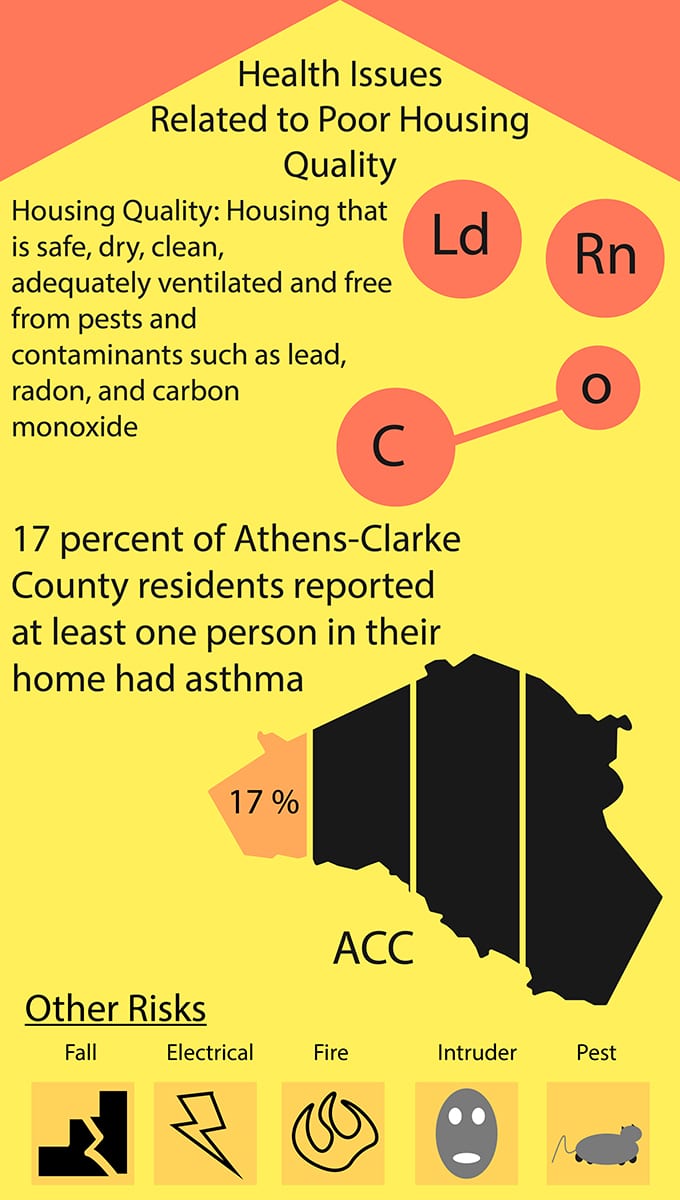Some building professionals in Athens, Ga., said they have seen poor building practices result in low-quality housing, which in turn can affect the health of those who reside in such homes.
Jeremy Field is the building science manager for Imery Group, a business specializing in high performance and eco-friendly construction. Field, who works to improve homes, said many new ones are constructed poorly.
“One of the biggest issues I see with new construction is the lack of quality,” Field said.
Field also said builders sometimes cut corners and do things that they should not to increase their profit margins. In doing so, they put the resident at risk physically, mentally and economically.
Why It’s Newsworthy: Low-quality housing is an issue that is being amplified by health risks. It may lead to physical, mental and economic issues that can be prevented by builders and residents.Andrew Carswell, who specializes in urban affairs, public policy, residential property management and home ownership, also said profits are often the top priority for building companies rather than quality, unless they are non-profit organizations.
Umit Yilmaz, a professor at UGA for the College of Environment and Design and an advocate for improving the quality of life in Athens, said he has seen builders cut corners as well. Yilmaz said that while new developments are being reviewed, a small percentage are required to be affordable.
“What [administrators, commissioners and officials] do within the cities and counties is try to define affordable housing for their community or jurisdiction. New developments are usually required to provide a certain percentage of affordable housing,” Yilmaz said.
While developers comply with these guidelines, Yilmaz said they put more money into the non-affordable side of the developments.
“They offer low-quality affordable housing. They use different materials and then the houses are small because the cost of housing is usually based on square feet. So, the developers play with the size and materials because the location is not flexible,” Yilmaz said.
Poor housing quality may also be contributing to serious health conditions because of poor construction and maintenance according to the National Center for Healthy Housing (NCHH).

(Graphic by Trevon Johnson)
According to the Department of Housing and Urban Development (HUD), the people who live in low-quality homes are exposed to hazards such as lead, mold, asbestos and falls. The potential health effects of such hazards include asthma, learning disabilities and cancer.
A study conducted by the College of Public Health at the University of Georgia said 17 percent of residents in Athens-Clarke County reported that at least one person in their home had asthma.
When housing is poorly constructed or maintained, residents may be exposed to noise from outside the home such as traffic and industrial activities. The health effects of noise include sleep disturbances, hearing impairment, hypertension and ischemic heart disease according to the NCHH.
The effects of poor housing quality do not stop at sicknesses. According to the Georgia Department of Public Health, poor lighting is linked to depression and mood disorders. Proper lighting is important because it allows people to see unsanitary conditions as well as prevent injury. Inadequate design and maintenance have also been linked to infestations of rats, mice and other pests
According to the 2015 Georgia health gap report, if residents of all counties in Georgia had the same opportunities for health, there could be 220,000 fewer households with severe housing problems.
Trevon Johnson is a senior majoring in journalism in the Grady College of Journalism and Mass Communication at the University of Georgia.







